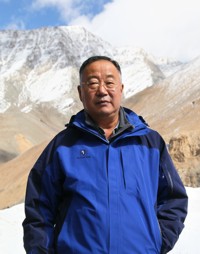S.T. Lee Lecture 2012

Linking cryospheric science in China and Antarctica
Professor Qin Dahe, 27 September 2012
China Meteorology Administration and the State Key Laboratory of Cryospheric Sciences, Chinese Academy of Sciences, China
View the talk here: 2012 S.T.Lee Lecture
Synopsis of lecture
Progress in cryospheric sciences in China over the last 55 years are reviewed and Chinese research in Antarctica discussed. Landmark studies include: (1) The first glacier inventory in China, (2) Mapping of frozen ground and constructing Qinghai-Xizang (Tibet) highway and railway, (3) Ice core studies on Tibet Plateau, and (4) Glaciological investigations on the Antarctic ice sheet, including the 1990 International Trans-Antarctic Expedition.
Present cryospheric studies are dedicated to the following themes:
- changes in glaciers, frozen ground and snow cover in arid and upland Asia, as part of the International Geosphere-Biosphere Programme for studying the relationship of the cryosphere with climate, water resources, ecology and disasters in cold regions and neighboring areas.
- Glaciological studies from Chinese ITASE traverse from Zhongshan Station to Dome-A, East Antarctica, with a focus on climate changes from decadal to millennial time scales, and,
- the North Greenland Eemian (NEEM) ice core study, seeking to quantify the relationship between hemispheric dust flows and marine iron fertilization.
In the next decade China is facing new frontiers in the cryospheric sciences in Antarctica and the rest of the world. These will be (1) Deep drilling at Dome-A, where we seek ice more than one million years old to capture the transition from 40,000 to 100,000 year cycles around 800,000 years ago; we are also interested in the older cores for studying interactions between melt-water and deep basal ice, (2) Global cryospheric change and its contribution to sea level, and (3) Influence of changes in permafrost extent to the global carbon budget.
Qin Dahe
Prof. Qin is a glaciologist, climatologist, Academician in the Chinese Academy of Sciences (CAS) , Academician in the Third Word Academy of Sciences(TWAS) and vice president of China Association for Science and Technology(CAST). Prof. Qin has served as Co-chair of Working Group I (Physical Science Basis) of the Intergovernmental Panel on Climate Change for two consecutive terms. He was Administrator of the China Meteorological Administration and Permanent Representative of China with the World Meteorological Organization from 2001-2007. In this he successfully promoted interaction among different disciplines and cooperation among government agencies and institutions. Prof. Qin participated in or led scientific expeditions to Antarctica (crossing the continent with American explorer Will Steger in 1989-90), the Arctic, the Qinghai-Tibetan Plateau and Western China. In Antarctica he studied snow “metamorphosis” and the relationship between surface processes and the climate above. He applied his findings to the mountain glaciers of western China, and then to ice cores in the Mount Qomolangma (Everest) region. He founded the State Key Laboratory on Cryosphere Sciences in China, and led early research on the Cryosphere in China and Its Impact on Climate, Hydrology, Ecology and Adaptation Response Strategies. He recently served as chairman of WMO Inter-committee Working Group on International Polar Year 2007-2008. In 2007 he was the recipient of Fifty-third International Meteorological Organization (IMO) Prize, and in 2010 became a member of the High-Level Taskforce on the Global Framework for Climate Services (GFCS).
